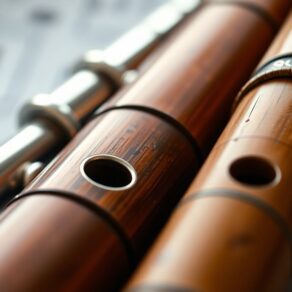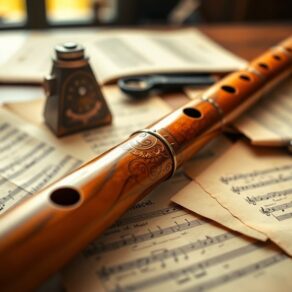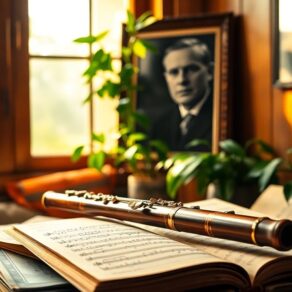To understand flute virtuosos and their signature works, you should explore their historical evolution and pivotal contributions. From Bach's Baroque innovations to Rampal's lyrical expressiveness, each player has enriched the flute repertoire. Notable figures like James Galway and Emmanuel Pahud blend classical and contemporary styles, pushing boundaries in performance. Composers such as Ibert and Jolivet crafted pieces that showcase the flute's range and technique. Mastering breath control, dynamic expression, and technical execution is essential for creating impactful performances. The continued evolution in flute mastery suggests a vast array of influences and resources available for further exploration.
Key Takeaways
- Jean-Pierre Rampal: Known for his virtuosic technique and lyrical interpretations, he popularized the flute as a solo instrument in the 20th century.
- James Galway: Blended classical and contemporary styles, celebrated for his charismatic performances and educational contributions to flute music.
- Emmanuel Pahud: Focused on innovative interpretations and expanding the flute repertoire through collaborations with contemporary composers.
- André Jolivet: Merged traditional techniques with modern elements, showcasing the flute's capabilities in his innovative compositions.
- Jacques Ibert: Composer of the essential "Concerto for Flute and Orchestra," known for its lyrical beauty and technical demands on flutists.
History of Flute Virtuosos
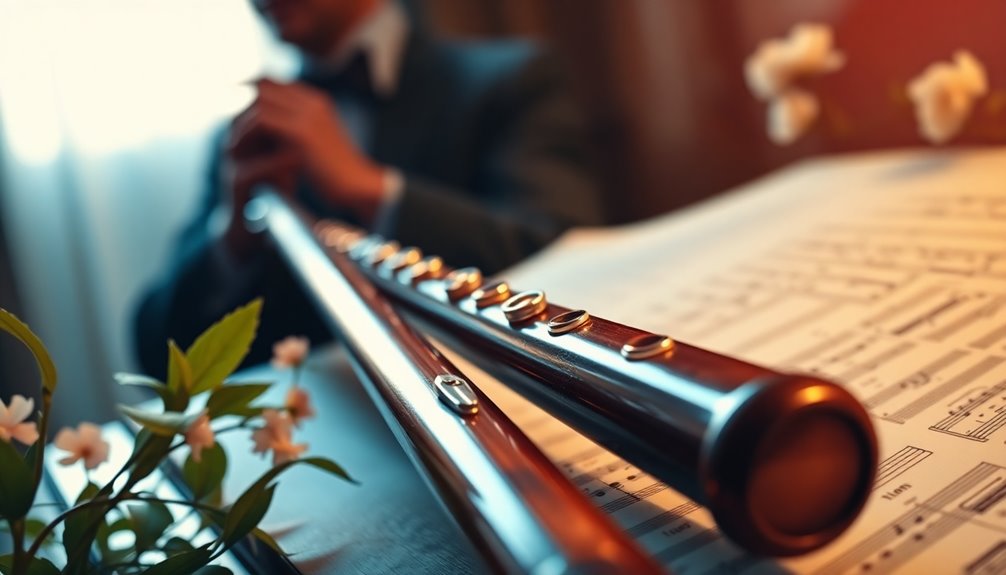
The history of flute virtuosos traces a fascinating evolution that spans centuries, revealing how individual talent and innovation have shaped the instrument's repertoire and performance practices. You'll find that each historical milestone marks a pivotal moment in the flute's development, showcasing not just technical prowess but also the cultural contexts that influenced these artists.
As you explore this journey, consider the Baroque era, where composers like Johann Sebastian Bach pushed the boundaries of flute music, leading to a significant evolution in technique and expression. This period laid the groundwork for future virtuosos, establishing the flute as a serious instrument in both solo and ensemble settings. The emergence of the concert flute during this time further solidified the instrument's role in music.
Moving into the Classical period, figures such as Jean-Pierre Rampal emerged, further refining the instrument's capabilities and expanding its repertoire. His contributions helped to bridge the gap between classical and contemporary styles, demonstrating the flute's versatility.
By the Romantic era, flutists began to adopt new techniques and styles, influenced by the expanding orchestral landscape. The emergence of advanced key mechanisms allowed for greater expressiveness and technical execution, which you can see reflected in the compositions of that time.
In understanding these historical milestones, you'll appreciate how each virtuoso not only advanced the flute's evolution but also contributed to a shared legacy that resonates within the community of flute players today. Each note played honors those who paved the way, creating a sense of belonging for all who embrace the art of flute playing.
Renowned Flute Players
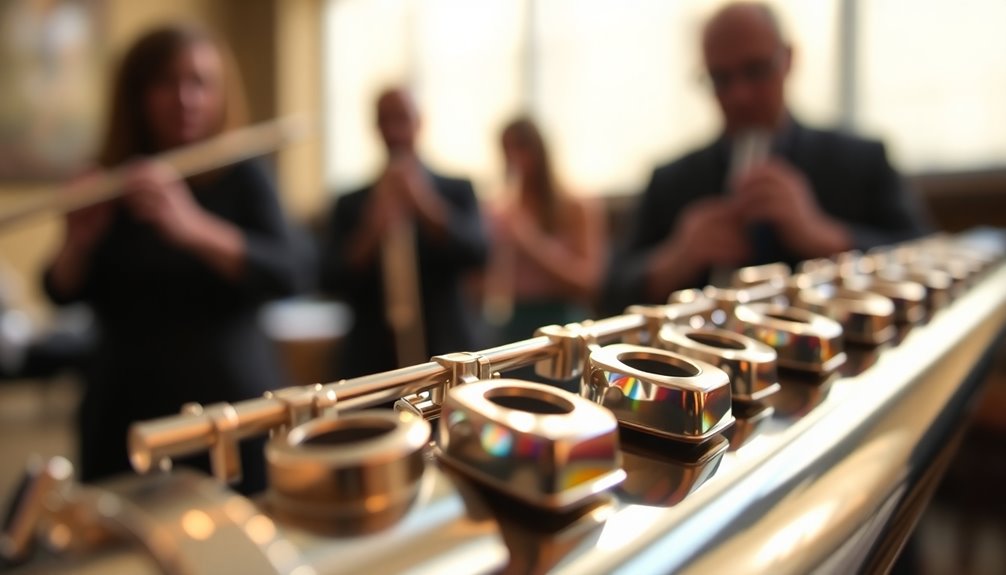
Many celebrated flute players have left an indelible mark on the instrument's landscape, each contributing unique artistry and innovation. As you investigate the world of renowned flutists, you'll discover how their distinct performance styles and approaches to flute pedagogy have shaped generations of musicians.
Take, for example, Jean-Pierre Rampal, whose virtuosic technique and lyrical interpretations helped popularize the flute as a solo instrument in the 20th century. His recordings and public performances not only showcased his remarkable skill but also inspired countless flutists to pursue excellence.
Similarly, James Galway, often referred to as "the Man with the Golden Flute," has mesmerized audiences with his charismatic stage presence and blending of classical and contemporary styles. His work in flute pedagogy, particularly through masterclasses and educational materials, has empowered many aspiring players.
You might also consider the contributions of Emmanuel Pahud, whose innovative interpretations and commitment to expanding the flute repertoire have made him a key figure in modern flute performance. His collaborations with contemporary composers reflect a dedication to pushing the boundaries of the instrument.
As you explore the lives and careers of these virtuosos, you'll notice how their diverse influences and philosophies not only redefine flute performance but also foster a sense of community among flutists. Additionally, many of these artists have also contributed to essential flute method books, which serve as valuable resources for developing musicians.
Influential Flute Composers
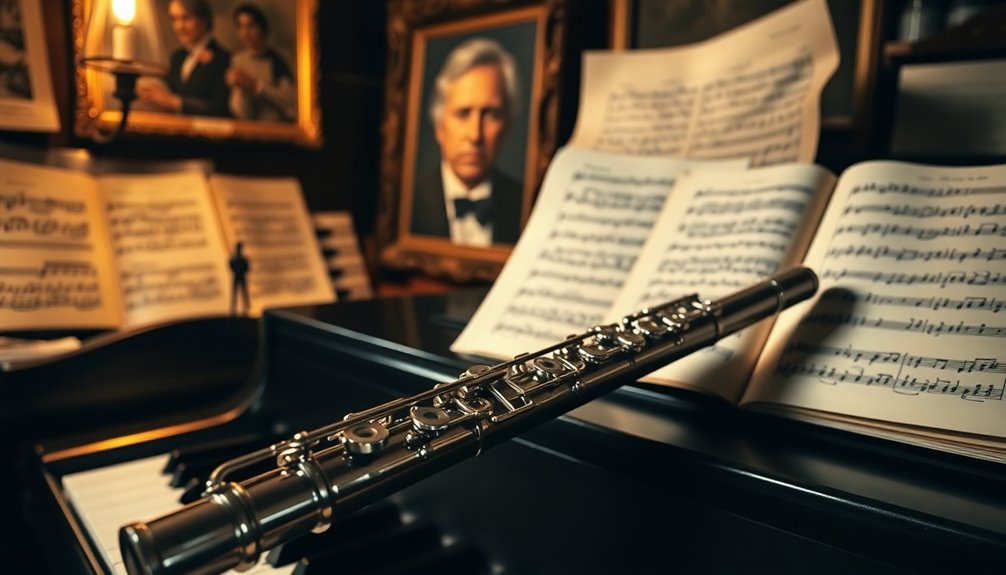
While exploring the territory of flute music, you'll encounter a diverse array of composers whose works have greatly influenced the instrument's repertoire. Among these influential figures, André Jolivet stands out for his innovative approach, merging traditional techniques with modern elements. His works often reflect a deep understanding of the flute's capabilities, showcasing flute innovations that expanded the boundaries of what the instrument could achieve.
Another pivotal composer is Jacques Ibert, whose Concerto for Flute and Orchestra remains a staple in the flute canon. Ibert's ability to blend lyrical beauty with technical demands provides flutists with a rich canvas for expression, encouraging performers to explore their interpretative skills.
In the sphere of contemporary composers, the likes of Kaija Saariaho and Ian Clarke have made significant contributions. Saariaho's ethereal works often employ unique soundscapes, pushing flutists to engage with extended techniques that challenge conventional playing methods.
Clarke, on the other hand, is known for his innovative compositions that invite flutists to explore a wide array of tonal colors and textures, thereby enriching the flute repertoire. Additionally, exploring extended techniques can greatly enhance a flutist's expressive capabilities and broaden their performance repertoire.
These composers, through their groundbreaking works, haven't only shaped the flute's past but also paved the way for future generations. By studying their contributions, you'll gain a deeper appreciation for the flute's evolution and its continuing journey within the contemporary music landscape.
Their legacies remind you that the flute is a living, breathing instrument, capable of endless exploration and expression.
Signature Works of Legend
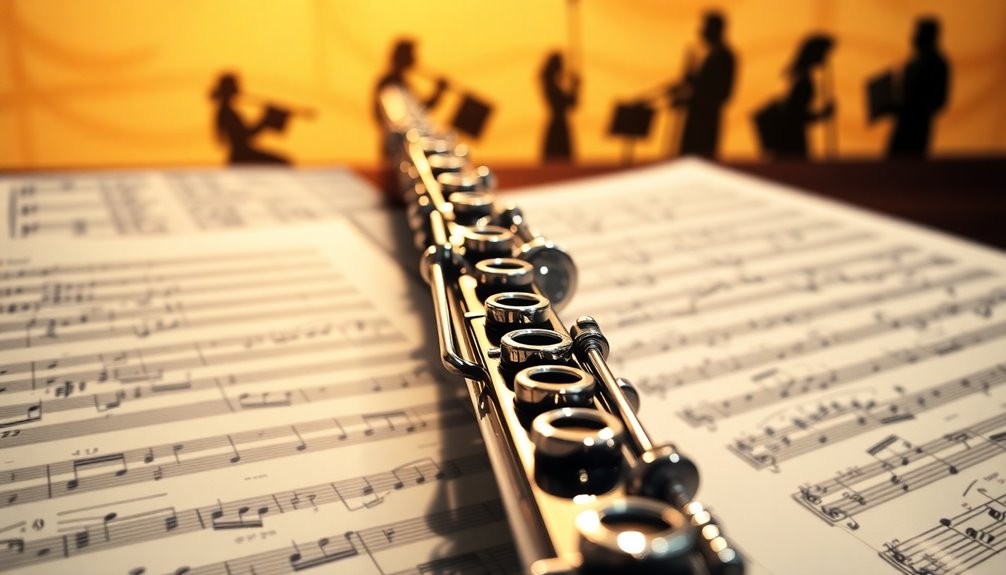
Signature works of legendary flutists often serve as defining moments in the instrument's history, showcasing their unique artistry and technical prowess. When you explore these compositions, you'll find that they embody specific flute techniques and performance styles that set benchmarks for aspiring flutists.
The works of Jean-Pierre Rampal, for instance, highlight a blend of lyrical expressiveness and dazzling agility, reflecting his ability to fuse classical tradition with contemporary flair. His interpretations of pieces like Mozart's Flute Concerto No. 1 remain pivotal for their emotional depth and technical precision.
Similarly, James Galway's signature piece, "The Man with the Golden Flute," exemplifies a virtuosic approach that marries folk influences with classical foundations. Galway's performance style captivates audiences, drawing them into a world where technical mastery meets heartfelt storytelling. His use of breath control and dynamic contrast pushes the boundaries of conventional flute techniques, inspiring countless musicians to emulate his artistry.
Moreover, you can't overlook the contributions of other flutists like Julius Baker and Robert Stallman, whose works continue to influence flute repertoire today. Their signature pieces often integrate innovative techniques and diverse performance styles that challenge and expand the capabilities of the flute. Additionally, the exploration of advanced flute techniques enhances the artistry of these musicians, further enriching their signature works.
Techniques of Master Flutists
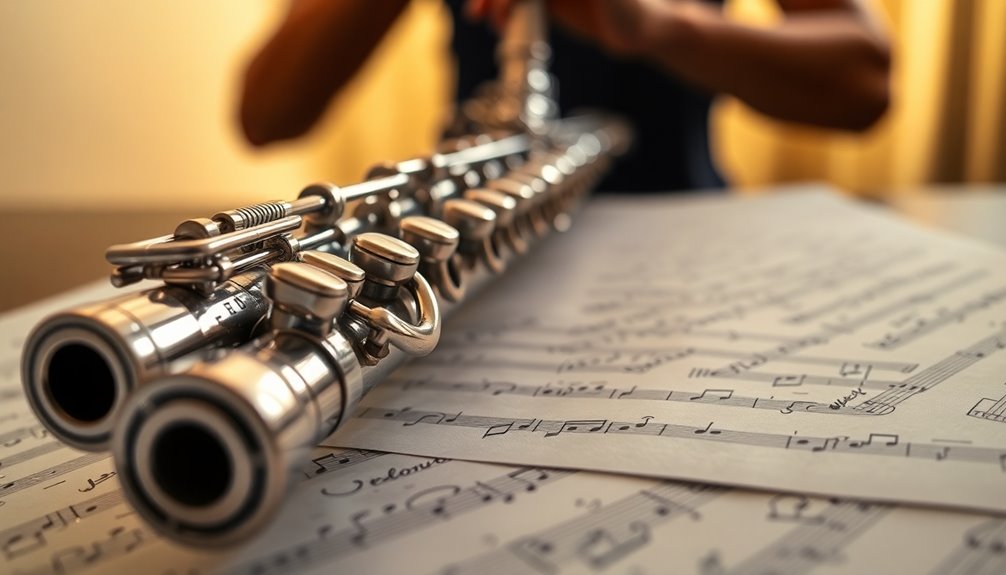
Master flutists often employ a range of advanced techniques that elevate their performances and redefine the possibilities of the instrument. Central to their artistry is breath control, which allows for sustained phrases and dynamic expression. Through careful training, you'll find that mastering your breath enables you to navigate the nuances of tone and volume, giving you the freedom to convey emotion in your playing. This skill not only enhances your sound but also contributes to the overall musicality of a piece. Breath control techniques are essential for overcoming performance-related issues in flute playing, leading to a polished and expressive musical delivery.
In addition to breath control, finger techniques are paramount in achieving fluidity and precision. Master flutists utilize various fingerings, including alternate fingerings, to facilitate rapid passages and intricate melodies. As you explore different finger techniques, you'll discover that they can greatly impact the clarity and agility of your playing. Practicing intricate patterns and scales diligently will help you develop muscle memory, enabling you to execute challenging sections with ease.
Moreover, the combination of these techniques often results in a distinctive personal style. Observing how master flutists blend breath control and finger techniques can inspire you to refine your own approach. They demonstrate that achieving virtuosity requires not only technical skill but also a deep connection to the music.
Notable Flute Concertos
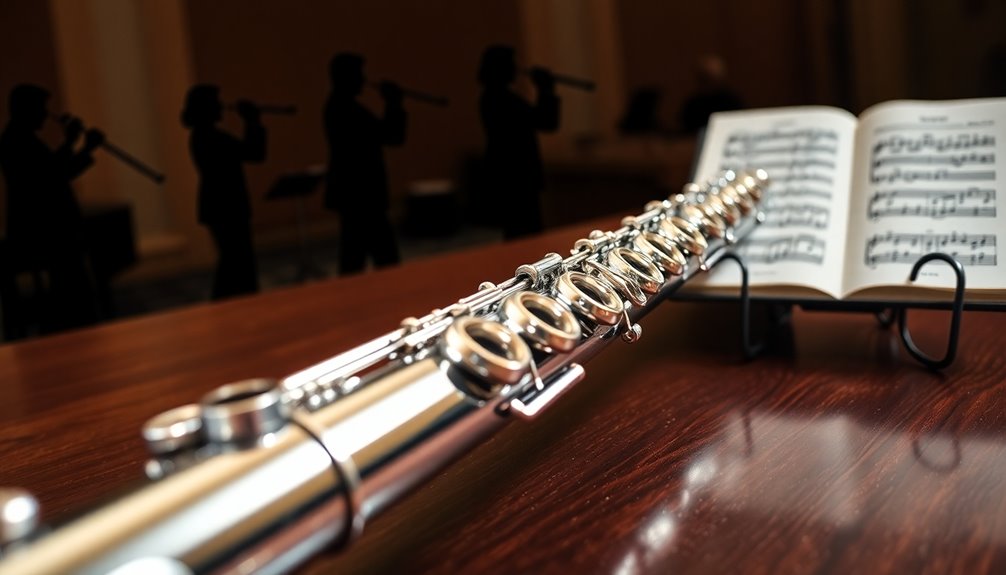
As you explore the world of flute concertos, you'll find that these compositions not only showcase the instrument's unique voice but also highlight the exceptional skills of the flutist.
Each concerto presents a rich tapestry of emotion and technical prowess, making them essential components of the flute repertoire. A thorough concerto analysis reveals nuances in style, orchestration, and the flutist's interpretative choices, allowing you to appreciate the depth of these works.
Here are five notable flute concertos you should consider:
- Wolfgang Amadeus Mozart's Flute Concerto No. 1 in G Major, K. 313
- Jacques Ibert's Concerto for Flute and Orchestra
- André Jolivet's Concerto for Flute and Orchestra
- Carl Philipp Emanuel Bach's Flute Concerto in D Minor, H. 425
- Cécile Chaminade's Concertino for Flute and Piano, Op. 107
These pieces not only exemplify the capabilities of the flute but also reflect the cultural contexts in which they were written. Exploring traditional flute melodies can enhance your understanding of the emotional and cultural significance woven into these concertos.
Each concerto provides unique challenges and opportunities for expression, inviting flutists to explore deeper into their craft. By studying these works, you'll become part of a vibrant community that celebrates the artistry of flute playing, enriching your understanding of the instrument's role in orchestral and solo settings.
Embrace this journey, and you'll certainly find your own voice as a flutist.
Flute Festivals and Competitions

What drives flutists to participate in festivals and competitions? For many, it's the opportunity to showcase their skills, connect with peers, and gain invaluable feedback. Flute competitions serve as a platform where you can test your abilities against fellow musicians while pushing your own artistic limits.
Festival participation not only enhances your performance experience but also fosters a sense of community among flutists of all levels. Engaging in these events often leads to significant personal and professional growth. You'll find that rigorous preparation for competitions sharpens your technical prowess and deepens your interpretive skills.
The thrill of performing in front of an audience or a panel of esteemed judges can also bolster your confidence, preparing you for future endeavors in music. Moreover, flute festivals offer masterclasses, workshops, and networking opportunities that can be transformative. Participating in an ensemble fosters teamwork and enhances your overall musicality.
You'll have the chance to learn from accomplished flutists, receive mentorship, and form connections that may open doors in your musical journey. In essence, participating in flute competitions and festivals is more than just a test of skill; it's about belonging to a vibrant community that shares your passion.
Each event presents a unique opportunity to celebrate the art of flute playing, enrich your musical experiences, and inspire you to pursue excellence. So, whether you're competing or simply attending, embrace the journey and let it elevate your love for the flute.
Impact on Contemporary Music
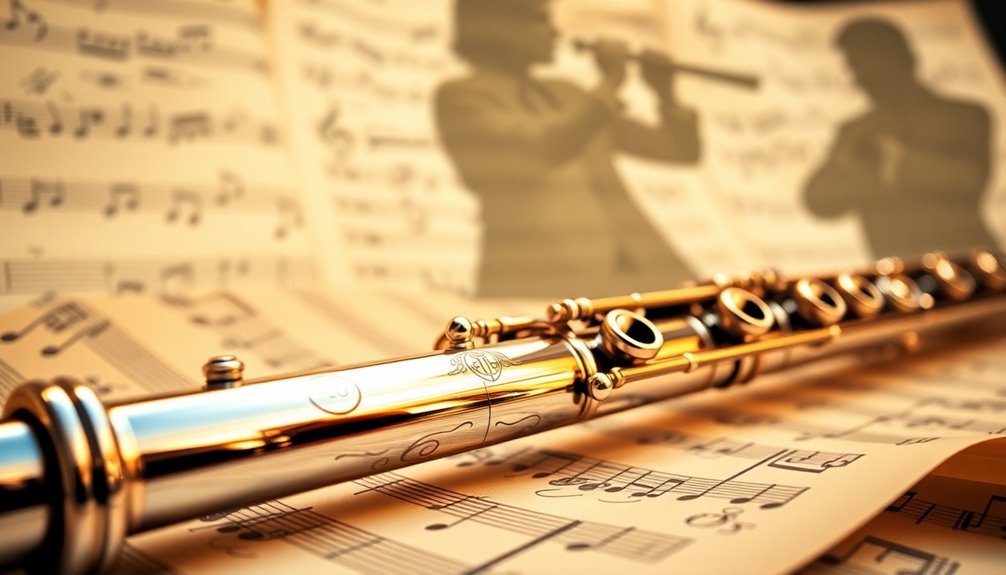
The impact of flute virtuosos on contemporary music is profound and multifaceted, influencing both composition and performance practices. These artists not only elevate the flute's status but also inspire new approaches to music-making. As a result, you'll find a rich tapestry of developments in the genre, particularly in areas such as:
- Flute improvisation: Pushing the boundaries of traditional playing and encouraging spontaneity.
- Contemporary collaborations: Uniting flutists with musicians from diverse genres, expanding the flute's reach.
- Innovative techniques: Introducing extended techniques that challenge conventional sounds.
- Cross-genre influences: Blurring lines between classical, jazz, and world music.
- Educational outreach: Inspiring a new generation of flutists to explore contemporary works.
These virtuosos often engage in contemporary collaborations, breaking down barriers between different musical styles. You may notice how they integrate elements of jazz, electronic music, and world traditions into their performances, creating a unique sound that resonates with modern audiences.
Additionally, flute improvisation has gained prominence, allowing flutists to express their individuality and creativity in real-time, often adapting to the musical landscape around them. Effective articulation techniques are essential in these improvisational settings, allowing for dynamic expression and clarity.
As you explore the works of these contemporary flute artists, you'll see how they not only preserve the rich legacy of the flute but also forge new paths that invite others into the fold. This evolution reflects a vibrant community where innovation thrives, and every note becomes a step towards a more inclusive musical future.
Iconic Flute Recordings
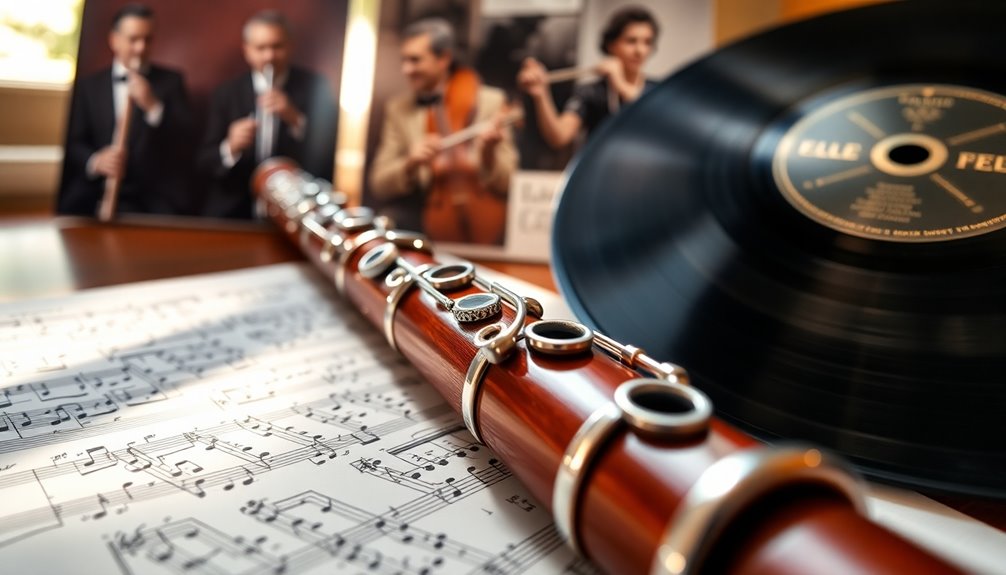
Throughout the history of flute music, iconic recordings have shaped not only the perception of the instrument but also the broader landscape of flute repertoire. These recordings serve as a bridge between the past and present, highlighting how flute virtuosos have pushed the boundaries of technique and expression. When you listen to these performances, you're not just hearing notes; you're experiencing a dialogue between artist and audience that resonates deeply.
One standout example is Jean-Pierre Rampal's collaboration with the orchestras of the 20th century. His recordings, such as the Mozart Flute Concertos, exemplify how memorable collaborations can elevate the music beyond the written score. Rampal's ability to blend with orchestral textures while maintaining a distinct voice offers insight into how interpretative choices can shape a piece.
Another iconic performance is that of James Galway, whose recordings of contemporary works have introduced new audiences to the flute. His signature tone, combined with innovative interpretations, has made his albums classics in the flute canon. Galway's artistry shows how a single musician can influence the trajectory of flute music, inspiring aspiring flutists and seasoned players alike.
In examining these recordings, you gain a deeper appreciation for the artistry involved. Each iconic performance not only showcases technical prowess but also embodies the emotional depth that the flute can convey. The exploration of various musical compositions in collections like "Selected Duets for Flute Volume 1" enhances the learning experience for both beginners and advanced players.
Future of Flute Virtuosity
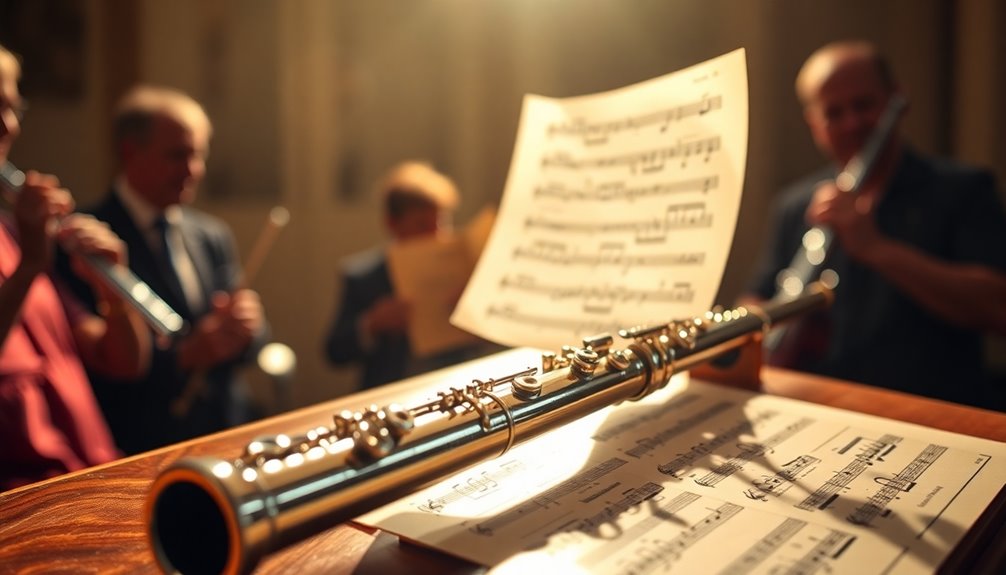
Flute virtuosity is on the brink of a transformative evolution, fueled by advancements in technology and a growing diversity in musical genres. As you look ahead, you'll notice that the landscape of flute performance is rapidly changing, influenced by emerging talent who are redefining what it means to be a virtuoso.
Digital platforms are democratizing music, allowing flutists to showcase their skills and connect with global audiences like never before.
Here's what you can expect in the future of flute virtuosity:
- Increased Accessibility: Online tutorials and streaming services will make flute education accessible to aspiring musicians worldwide.
- Genre Fusion: Expect to see more flutists blending classical techniques with genres like jazz, pop, and electronic music, creating unique soundscapes.
- Innovative Collaborations: Emerging talents are likely to collaborate across genres, leading to fresh perspectives and techniques in flute performance.
- Tech Integration: Virtual reality and augmented reality could soon play a role in performance and teaching, offering immersive experiences.
- Social Media Influence: Platforms like Instagram and TikTok will continue to shape the careers of flutists, emphasizing creativity and individuality.
- Community Engagement: Online platforms will foster connections with fellow flutists, enhancing motivation and providing valuable feedback through community forums.
As you engage with the future of flute virtuosity, remember that these changes not only enhance personal expression but also build community among flutists.
This evolution invites you to participate actively, fostering a sense of belonging in a vibrant, ever-changing musical landscape.
Frequently Asked Questions
What Are the Best Flutes for Aspiring Virtuosos?
When you're looking for the best flutes for aspiring virtuosos, you should consider top brands like Yamaha, Pearl, and Gemeinhardt.
These professional flutes offer exceptional craftsmanship and sound quality, essential for developing your skills.
Pay attention to features like key mechanism and material, as they can greatly impact your playing experience.
Investing in a quality instrument not only enhances your performance but also fosters a deeper connection to the music you love.
How Can I Improve My Flute Playing Skills?
Imagine your flute playing as a dance; each note flows gracefully, guided by breath control and finger agility.
To improve, practice deep breathing exercises to enhance your control and sustain longer phrases. Incorporate finger drills, focusing on speed and precision, to build agility.
Regularly challenge yourself with scales and etudes, pushing your limits while enjoying the process. Embrace the journey, and you'll find yourself transforming into a more skilled and confident flutist.
What Common Mistakes Do Flute Players Make?
Many flute players often encounter common mistakes that hinder their progress. You might struggle with intonation issues, not realizing that slight adjustments in finger positioning can make a significant difference.
Additionally, inadequate breathing techniques can lead to a lack of control over dynamics and tone. Focusing on these areas can enhance your playing.
Are There Specific Warm-Up Routines for Flutists?
Are you looking to enhance your flute skills?
Specific warm-up routines can considerably boost your breath control and refine your finger techniques. Start with long tones to strengthen your airflow, followed by scales that challenge your dexterity.
Incorporate interval exercises to improve your pitch accuracy. By consistently practicing these routines, you'll develop a solid foundation, fostering a deeper connection with your instrument and elevating your performance to new heights.
How Do I Choose a Flute Teacher?
Choosing a flute teacher involves considering their teaching styles and how they align with your learning preferences. Observe their methods during a trial lesson; do they encourage creativity, or focus on technique?
Also, think about lesson frequency—consistent practice fosters growth. Evaluate their experience and expertise, ensuring they can guide your progress effectively.
Ultimately, finding a teacher who resonates with you can create a supportive environment that nurtures your passion for music.
Conclusion
In the world of flute virtuosity, you've seen how the echoes of past masters resonate through time, shaping contemporary music. As the adage goes, "the more things change, the more they stay the same." This continuity underscores the significance of both historical and modern flutists. By studying their techniques and signature works, you can appreciate the evolving artistry of the flute. Embracing this legacy, you're encouraged to explore, innovate, and contribute to the instrument's rich tradition.

